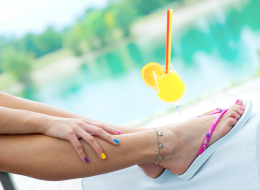Snow It All The Coolest Winter Foot Care Tips
You may have the “stockings hung by the chimney with care” part down, but there are a number of other details to pay attention to when it comes to foot care during winter.
Boot-season gives millions of people the idea that it’s ok to neglect their feet, but just because those tootsies are in hiding doesn’t mean they should be ignored. In fact, it’s more important than ever to take care of your feet and toes during the winter season, when things like cold weather, damp socks and heated air can lead to cracked skin, fungal infections, "winter heels," and maybe even frostbite. So read on for the best winter foot care tips that will keep your feet happy throughout the season so they’re ready to shine come summertime!
Choose Appropriate Winter Footwear
Whether you’re walking to work on snow-covered sidewalks or swooshing down the ski slopes, it’s important to choose proper winter footwear that keeps your feet warm, dry and protected. Wintertime shoes should have ample padding but be roomy enough so as not to cut off circulation in the feet and toes. Avoiding man-made materials and other non-breathable fabrics can help control foot sweat, which could create an extra chill that can lead to frostbite on super cold winter days.
Cover Your Feet With Proper Socks
During the cold months, it’s best to choose breathable socks that will keep your feet both warm and dry. Wool or other moisture-wicking socks can help control foot sweat that can make your feet freeze. Interested in knowing whether or not your feet are sweating too much during the winter months? Extreme paleness and wrinkly toes are common signs of over-saturation.
READ MORE: How To Keep Your Feet Warm In Cold Weather
Take Off Wet Shoes and Socks Right Away
It’s pretty tough to avoid shoe and sock dampness during the winter, so it’s important to remove wet shoes and socks as soon as possible. Keeping them on leaves your feet susceptible to fungal and bacterial infections. You should also make sure that shoes are thoroughly dry before wearing them again. If they're not fully dry, choose a new pair to help keep your feet fresh and dry.
*Editor’s Tip: Try to carry an extra pair of socks for emergency situations, such as when you just can’t say no to jumping into a giant snow drift.
Use Hydrating Foot Cream
Skin tends to dry out during the cold months when dry air and heaters zap moisture from the body. Avoid corns, calluses and cracked heels by keeping your feet properly moisturized with good quality foot creams.
RELATED: Why AmLactin Is Considered A Miracle Cure For Dry Feet
Don’t Slack On Exercise During Winter Months
It’s pretty easy to blow off exercise when it’s cold outside; it’s much cozier to stay inside where it’s warm rather than go for an icy-cold walk or jog. But sitting around all day can lead to foot and ankle swelling. If you must stay inside, then be sure to do a few basic leg exercises to keep your blood flowing. If you brave the cold, be sure to allow time for extra stretching, as winter weather can make you less flexible and therefore prone to more injuries to your feet and the rest of your body.
Take A Toenail Polish Break
If there ever was a time for your toenails to go polish-free (gasp!), it’s right now, when your tootsie are covered by boots and socks. Going polish-free allows the nails to better soak up creams and lotions, and not using polish remover for extended periods of time will help fight against nail dryness. Meanwhile, if you use nail lacquers that contain yellowing agents like formaldehyde, going polish-free will allow the discolored nail to grow out so you’ll be perfectly ready for summertime shoes and sandals.
READ MORE: Do Your Nails Really Need To Breathe?
Treat Yourself To Warming Winter Foot Soaks
Wintertime can be a busy, stressful season, so treat yourself to relaxing, warming foot soaks once a week or so. Because having happy feet means having a happy winter season!
Notice concerning medical entries:
Articles having medical content shall serve exclusively for the purpose of general information. Such articles are not suitable for any (self-) diagnosis and treatment of individual illnesses and medical indications. In particular, they cannot substitute for the examination, advice, or treatment by a licensed physician or pharmacist. No replies to any individual questions shall be effected through the articles.






